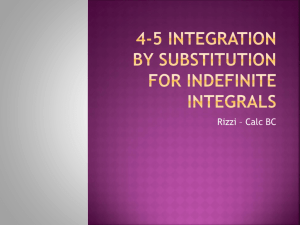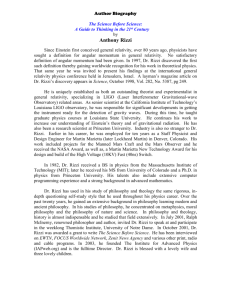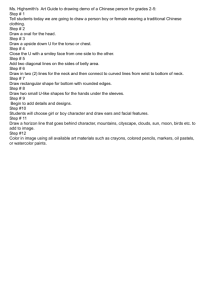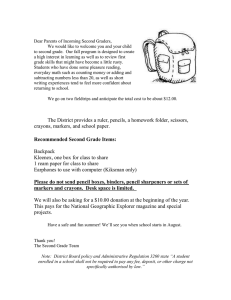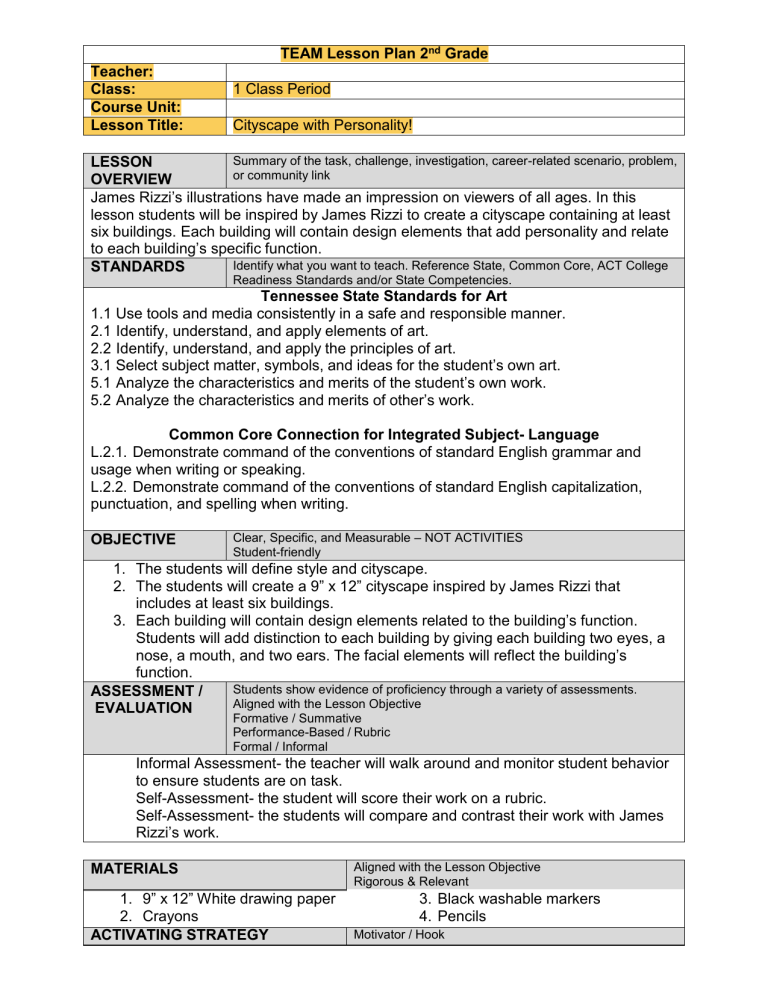
TEAM Lesson Plan 2nd Grade Teacher: Class: Course Unit: Lesson Title: 1 Class Period Cityscape with Personality! Summary of the task, challenge, investigation, career-related scenario, problem, LESSON or community link OVERVIEW James Rizzi’s illustrations have made an impression on viewers of all ages. In this lesson students will be inspired by James Rizzi to create a cityscape containing at least six buildings. Each building will contain design elements that add personality and relate to each building’s specific function. Identify what you want to teach. Reference State, Common Core, ACT College STANDARDS Readiness Standards and/or State Competencies. Tennessee State Standards for Art 1.1 Use tools and media consistently in a safe and responsible manner. 2.1 Identify, understand, and apply elements of art. 2.2 Identify, understand, and apply the principles of art. 3.1 Select subject matter, symbols, and ideas for the student’s own art. 5.1 Analyze the characteristics and merits of the student’s own work. 5.2 Analyze the characteristics and merits of other’s work. Common Core Connection for Integrated Subject- Language L.2.1. Demonstrate command of the conventions of standard English grammar and usage when writing or speaking. L.2.2. Demonstrate command of the conventions of standard English capitalization, punctuation, and spelling when writing. OBJECTIVE Clear, Specific, and Measurable – NOT ACTIVITIES Student-friendly 1. The students will define style and cityscape. 2. The students will create a 9” x 12” cityscape inspired by James Rizzi that includes at least six buildings. 3. Each building will contain design elements related to the building’s function. Students will add distinction to each building by giving each building two eyes, a nose, a mouth, and two ears. The facial elements will reflect the building’s function. Students show evidence of proficiency through a variety of assessments. ASSESSMENT / Aligned with the Lesson Objective EVALUATION Formative / Summative Performance-Based / Rubric Formal / Informal Informal Assessment- the teacher will walk around and monitor student behavior to ensure students are on task. Self-Assessment- the student will score their work on a rubric. Self-Assessment- the students will compare and contrast their work with James Rizzi’s work. MATERIALS 1. 9” x 12” White drawing paper 2. Crayons ACTIVATING STRATEGY Aligned with the Lesson Objective Rigorous & Relevant 3. Black washable markers 4. Pencils Motivator / Hook An Essential Question encourages students to put forth more effort when faced with complex, open-ended, challenging, meaningful, and authentic questions. 1. The teacher will begin the class by discussing James Rizzi and showing examples of his work. 2. The teacher will introduce vocabulary related to this project and James Rizzi’s work. Step-By-Step Procedures – Sequence INSTRUCTION Discover / Explain – Direct Instruction Modeling Expectations – “I Do” Questioning / Encourages Higher Order Thinking Grouping Strategies Differentiated Instructional Strategies to Provide Intervention & Extension 1. See set. 2. The teacher will introduce the project with a pre-made example and state the objectives. 3. The teacher will demonstrate the process of creating a cityscape. While leading the demonstration the teacher will discuss various types of buildings and ask students to describe defining characteristics of each building. 4. The teacher will inform students that their buildings will contain facial expressions that relate to its specific function. 5. Crayons, pencils, markers, and drawing paper will be on each table. After the demonstration students will have the opportunity to create their own cityscape. 6. Students will first sketch their cityscape with a pencil. 7. As they draw each of the six buildings students will include the required facial elements, which are two eyes, a mouth, two ears, and a nose. 8. Once the sketch is complete students can add color with crayons and outline their buildings with black washable markers. 9. The teacher will walk around and monitor student behavior as they work and assist students as needed. 10. Cleanup will occur during the last 10 minutes of class. Students will return materials and place their work in the appropriate class bin. ALTERNATE/ EXTRA ACTIVITIES Students can use watercolors to create a crayon resist. Students with special needs may use larger crayons and markers, which may be easier to hold. CLOSURE Reflection / Wrap-Up Summarizing, Reminding, Reflecting, Restating, Connecting 1. The student will define style and cityscape. 2. In their journal students will compare and contrast their final piece with James Rizzi’s work. CROSS-CURRICULAR CONNECTIONS 1. Writing 2. Language Extended Learning Books: James Rizzi: The New York Paintings by James Rizzi. My Neighborhood: Places and Faces by Lisa Bullard Online Enrichment: PBS Kids Wilson & Ditch: http://pbskids.org/wilsonandditch/cities/?city=nashville James Rizzi Online Gallery: http://www.rizzigallery.com/ Additional Activities: PBS Kids Zoom Future City: http://pbskids.org/zoom/activities/sci/futurecity.html Dick Blick Online Dancing Houses: http://www.dickblick.com/lesson-plans/dancing-houses/ For additional lesson plans and activities, visit us online at www.fristkids.org. This lesson plan was created by an art education student in the Frist Center for the Visual Arts’ Teaching Assistant program under the guidance of education department staff and/or a mentor teacher. The Teaching Assistant program is designed to introduce participants to museum education by providing unique teaching experiences in an informal learning environment. For more information about this program or other educational opportunities offered by the Frist Center, please visit our website at www.fristcenter.org.
